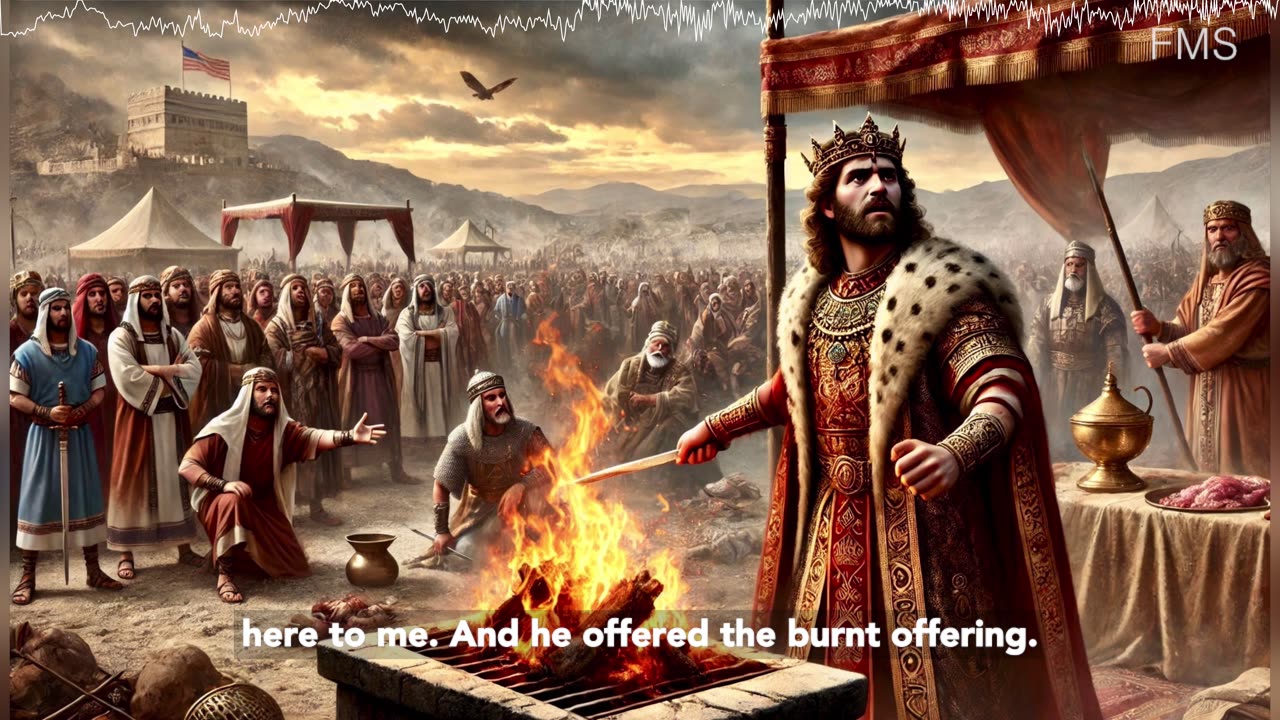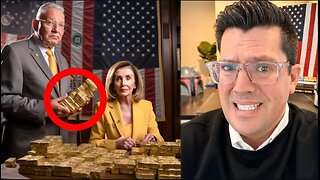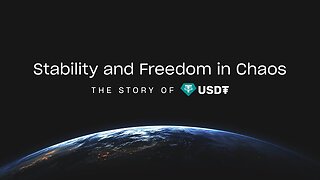Premium Only Content

Saul's Blunder in 1 Samuel 13 and Yahuah's Reaction
In 1 Samuel 13, Saul commits a significant blunder by offering burnt offerings himself instead of waiting for the prophet Samuel. This act leads to severe consequences for Saul and his lineage. To understand why Yahuah was so upset with Saul's actions and why David later performed similar acts without such dire repercussions, we need to explore the context and implications of these events.
Context of 1 Samuel 13:
* Saul's Waiting and Impatience: Saul waits the appointed seven days for Samuel at Gilgal, but as Samuel does not arrive and the people begin to scatter, Saul takes matters into his own hands. He offers the burnt offering, a role designated for the priest or prophet, not the king.
* Samuel's Reaction: When Samuel arrives, he rebukes Saul, stating that his kingdom will not endure. Samuel explains that Saul's actions were foolish and that he did not keep the command Yahuah gave him (1 Samuel 13:13-14).
Why Was Yahuah So Upset?
1. Violation of Sacred Roles: Saul's actions blurred the lines between the king's role and the priest's role. In ancient Israel, the king was expected to rule according to Yahuah's laws, but the religious duties, especially offering sacrifices, were reserved for the priests. By performing the sacrifice, Saul overstepped his bounds and violated Yahuah's established order.
2. Disobedience: Saul's impatience and decision to perform the sacrifice demonstrated a lack of trust and obedience to Yahuah. Samuel had instructed Saul to wait, and his failure to do so was seen as direct disobedience to Yahuah's command.
3. Presumption and Ego: Saul's actions reflected a growing arrogance and presumption. By taking on priestly duties, he demonstrated that he believed his judgment and actions were above the divine instructions provided through Samuel.
Contrast with David:
* David and the Showbread: In 1 Samuel 21:1-6, David eats the consecrated bread, which was reserved for priests. However, David's situation was different. He was in urgent need, fleeing for his life, and sought provision for survival. The priest Ahimelech allowed it, understanding the extenuating circumstances and showing compassion.
* Divine Favor and Intent: David’s heart and intent were aligned with seeking Yahuah's will, and he often sought divine guidance before acting. This contrasts with Saul, whose actions stemmed from fear and self-reliance.
Implications for Saul's Kingship:
* Loss of Dynasty: Samuel's rebuke indicated that Saul’s dynasty would not endure. Yahuah sought a man after His own heart to lead Israel (1 Samuel 13:14). This prophecy pointed to David, who would later become king.
* Spiritual Authority: Saul’s act represented a fundamental misunderstanding of his role and Yahuah’s authority. It was not just the act of offering a sacrifice but the broader implications of disregarding divine commands and assuming spiritual authority without Yahuah’s blessing.
Modern Parallels:
* Changing Divine Ordinances: A comparison to the papal decree changing the Sabbath from the seventh day to the first day draws a parallel to the presumption of altering divinely instituted times and laws. Such actions can be seen as overstepping human authority into divine prerogatives.
Reflection:
Saul’s mistake serves as a cautionary tale about the importance of obedience, humility, and understanding one's role within Yahuah's order. It underscores the need for leaders to seek and adhere to divine guidance rather than acting out of fear, impatience, or ego.
-
 13:00
13:00
Exploring With Nug
4 hours ago $2.53 earnedHe Went To Get A Haircut And Vanished WIthout a Trace!
26.9K -
 18:53
18:53
DeVory Darkins
1 day ago $24.07 earnedTrump JUST ENDED Mayor Karen Bass During HEATED Meeting
59.3K207 -
 21:06
21:06
Russell Brand
8 hours agoIT'S COMING
108K335 -
 21:26
21:26
Stephen Gardner
1 day ago🔥What JUST leaked out of Congress must be STOPPED NOW!
116K274 -
 53:25
53:25
tether
11 days agoStability and Freedom in Chaos: The Story of Tether USD₮ | Tether Documentary (USDT)
132K5 -
 56:44
56:44
VSiNLive
2 days agoFollow the Money with Mitch Moss & Pauly Howard | Hour 1
72.1K2 -
 36:50
36:50
Anthony Pompliano
2 days ago $16.06 earnedInvestors Are ALL-IN On Bitcoin
66.9K20 -
 32:19
32:19
SB Mowing
9 days agoA Backyard She’s NEVER Seen – Now Safe for the Kids to Play!
62.9K28 -
![[Day 26] CS Blast bounty baby](https://1a-1791.com/video/fwe2/8a/s8/1/Z/H/j/_/ZHj_w.0kob-small-Day-26-CS-Blast-bounty-baby.jpg) 2:09:11
2:09:11
ggezlol_tv
12 hours ago[Day 26] CS Blast bounty baby
94.5K3 -
 2:32:17
2:32:17
Sgtfinesse
11 hours ago💥Sunday Morning Hunt for Featherweight Artifact | New World PVP Server: Sclavia
95.7K4